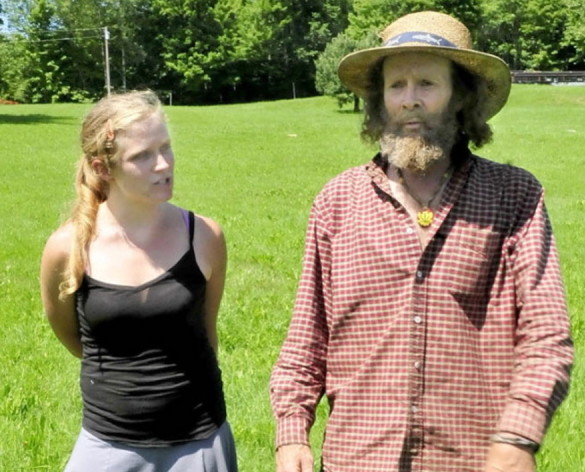SKOWHEGAN — A Starks family opposed to construction of a controversial cellular telephone transmission tower on land neighboring their farm in Starks will appeal a recent Somerset Superior Court ruling denying their bid to stop construction of the 195-foot cellphone tower .
Harry and Cindy Brown, owners of a farm bordering the proposed tower site, say that the Starks Board of Appeals conducted the wrong type of hearing while reviewing their original objection to the Starks Planning Board approval of the tower.
The Browns claim that the Planning Board made errors in reviewing the application, filed in July 2013 by Boston-based Bay Communications, and that the Board of Appeals applied the wrong standard in considering the case were dismissed last month by the Somerset County Superior Court. The couple has served notice that it is taking the case to the state Supreme Judicial Court on grounds that the county court also erred in its ruling.
In an appeal notice filed Aug. 28, the Browns claim that the Starks Appeals Board should have conducted a de novo hearing, a completely new look at the case, as opposed to conducting an appellate hearing, in which the Appeals Board evaluates whether the Planning Board followed state and federal laws and the rules of town government.
“The Browns were not happy with the Planning Board’s decision, and they appealed to our town Appeals Board to have the decision overturned,” said First Selectman Paul Frederic. “Both the Appeals Board and the Superior Court have upheld the decision. I don’t know where this will go at the Supreme Court level, but we’ll just work through the system as appropriate.”
The tower, which would initially handle service through AT&T Wireless, but which can accommodate up to five additional carriers, has been endorsed by selectmen as an opportunity to provide the town with better emergency services, faster Internet connections and an attraction for businesses.
But the Browns, who live about 700 feet from the proposed site, have opposed the plan since July 2013, saying they are concerned about visual, environmental and health effects. They declined to comment on Monday.
In March the Browns appealed the case to the Superior Court on its claims that the Planning Board made errors reviewing the application and that the Board of Appeals did not follow the proper standard of review over the other board’s actions.
The Browns argued that the Planning Board did not provide sufficient evidence regarding the project’s visual impact, the impact on the quality of groundwater and impact on the condition of Abijah Hill Road, a public dirt road by which the site would be accessed.
A Superior Court judge ruled that the Board of Appeals acted within the town ordinance and that the Planning Board had sufficient evidence to conclude that the project would not lead to unsafe conditions on public roads and would not affect groundwater supplies.
In response to the Browns’ argument that the tower would have an adverse effect on the scenic quality of the area, the court stated that the Planning Board’s argument that a surrounding tree canopy about 60 feet high would lessen the scenic impact and that there was no threat to wildlife in the area.
“The Board of Appeals properly conducted appellate review in upholding the Planning Board’s decision in the case,” wrote Superior Court Justice A.M. Horton. “After reviewing the record before the Planning Board, the court concludes that the Planning Board did not err in approving the proposal to construct a cell tower.”
Rachel Ohm — 612-2368
Send questions/comments to the editors.




Success. Please wait for the page to reload. If the page does not reload within 5 seconds, please refresh the page.
Enter your email and password to access comments.
Hi, to comment on stories you must . This profile is in addition to your subscription and website login.
Already have a commenting profile? .
Invalid username/password.
Please check your email to confirm and complete your registration.
Only subscribers are eligible to post comments. Please subscribe or login first for digital access. Here’s why.
Use the form below to reset your password. When you've submitted your account email, we will send an email with a reset code.